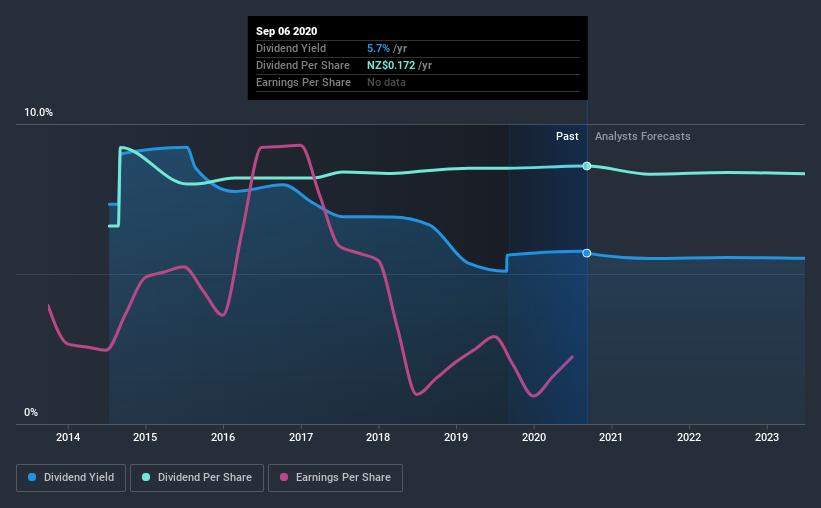It Might Not Be A Great Idea To Buy Genesis Energy Limited (NZSE:GNE) For Its Next Dividend

Readers hoping to buy Genesis Energy Limited (NZSE:GNE) for its dividend will need to make their move shortly, as the stock is about to trade ex-dividend. This means that investors who purchase shares on or after the 10th of September will not receive the dividend, which will be paid on the 25th of September.
Genesis Energy's next dividend payment will be NZ$0.099 per share, on the back of last year when the company paid a total of NZ$0.17 to shareholders. Last year's total dividend payments show that Genesis Energy has a trailing yield of 5.7% on the current share price of NZ$3.02. Dividends are a major contributor to investment returns for long term holders, but only if the dividend continues to be paid. We need to see whether the dividend is covered by earnings and if it's growing.
Check out our latest analysis for Genesis Energy
Dividends are typically paid out of company income, so if a company pays out more than it earned, its dividend is usually at a higher risk of being cut. Genesis Energy paid out a disturbingly high 385% of its profit as dividends last year, which makes us concerned there's something we don't fully understand in the business. A useful secondary check can be to evaluate whether Genesis Energy generated enough free cash flow to afford its dividend. Dividends consumed 65% of the company's free cash flow last year, which is within a normal range for most dividend-paying organisations.
It's disappointing to see that the dividend was not covered by profits, but cash is more important from a dividend sustainability perspective, and Genesis Energy fortunately did generate enough cash to fund its dividend. Still, if the company repeatedly paid a dividend greater than its profits, we'd be concerned. Very few companies are able to sustainably pay dividends larger than their reported earnings.
Click here to see the company's payout ratio, plus analyst estimates of its future dividends.
Have Earnings And Dividends Been Growing?
When earnings decline, dividend companies become much harder to analyse and own safely. If business enters a downturn and the dividend is cut, the company could see its value fall precipitously. Readers will understand then, why we're concerned to see Genesis Energy's earnings per share have dropped 16% a year over the past five years. Ultimately, when earnings per share decline, the size of the pie from which dividends can be paid, shrinks.
The main way most investors will assess a company's dividend prospects is by checking the historical rate of dividend growth. In the last six years, Genesis Energy has lifted its dividend by approximately 4.5% a year on average. The only way to pay higher dividends when earnings are shrinking is either to pay out a larger percentage of profits, spend cash from the balance sheet, or borrow the money. Genesis Energy is already paying out a high percentage of its income, so without earnings growth, we're doubtful of whether this dividend will grow much in the future.
To Sum It Up
Has Genesis Energy got what it takes to maintain its dividend payments? Earnings per share have been shrinking in recent times. Worse, Genesis Energy's paying out a majority of its earnings and more than half its free cash flow. Positive cash flows are good news but it's not a good combination. It's not the most attractive proposition from a dividend perspective, and we'd probably give this one a miss for now.
So if you're still interested in Genesis Energy despite it's poor dividend qualities, you should be well informed on some of the risks facing this stock. Every company has risks, and we've spotted 2 warning signs for Genesis Energy you should know about.
A common investment mistake is buying the first interesting stock you see. Here you can find a list of promising dividend stocks with a greater than 2% yield and an upcoming dividend.
This article by Simply Wall St is general in nature. It does not constitute a recommendation to buy or sell any stock, and does not take account of your objectives, or your financial situation. We aim to bring you long-term focused analysis driven by fundamental data. Note that our analysis may not factor in the latest price-sensitive company announcements or qualitative material. Simply Wall St has no position in any stocks mentioned.
Have feedback on this article? Concerned about the content? Get in touch with us directly. Alternatively, email editorial-team@simplywallst.com.

 Yahoo Finance
Yahoo Finance 
